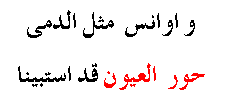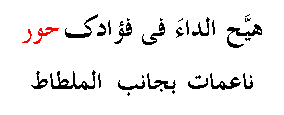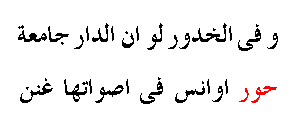It has already pointed out previously that the Arabic word “hur al-ayn” (houris), meaning a beautiful, voluptuous woman, was already well known in the pre-Islamic Arabia and many instances of its usage have been preserved in the pre-Islamic poetry.
Some examples may be seen as follows :

Running translation : “And the maidens like ivory statues white of eyes, did we capture.”

Running translation : “They have touched your heart, these tender white maidens, beside the river bank.”

Running translation : “And in the women’s chamber when the house is full, are the white maidens with charming voices.”
In all these verses, we are dealing with human women, flawless in beauty — a very dark pupil and a very white iris of their eyes being an essential and particularly appealing feature of their beauty. As the verse of ‘Abid indicates, such women were considered a very precious booty by the pre-Islamic Arabs in the raids of those times.
It must be noted here that the concept of “houris of Paradise” was generally unknown to the pre-Islamic Arab since they did not believe in the idea of Hereafter. However, the concept of “Maidens of Paradise” was known to the Christians (especially the Syriac Christians) of the pre-Islamic times.
In the last century, first Hubert Grimme
St. Ephraim, in explicit sexual connotation, evoked the welcoming femininity of the heavenly “vines” (“gupna”, grammatically feminine in Syriac), which were to take to their immaculate bosoms the aged monks, whose life of abstinence had never known the earthly loves and tenderness.
Thus we read in the strophy 18 :
- Whoever has abstained from wine on earth,
for him do the vines of Paradise yearn.
Each one of them holds out to them a bunch of grapes.
And if a man had lived in chastity, they [feminine] receive him
in a pure bosom,
because he as a monk did not fall into the bosom
and bed of earthly love.
Here we clearly see St. Ephraim’s feeble attempts to spiritualize his sensual imagery.
Just a little earlier in the text (in strophy 15) we find a solitary virgin, abstinent in her earthly lives, being surrounded by male beings (prophets, angels, apostles) in the heavens :
- The virgin who rejected
the marriage crown that fades
now has the radiant marriage chamber
that cherishes the children of light,
shining out because she rejected
the works of darkness-
To her who was alone
in a lonely house
the wedding feast now grants tranquility :
here angels rejoice,
prophets delight,
and apostles add splendor.
The intended sexuality and the reward, of a sexual nature, in the heavens for the righteous of the world, are clear in these passages. Hence it is proved that the concept of “Maidens of Paradise” was also known in the pre-Islamic Arabia, especially among the Christians. The Qur’an, as is its style under normal circumstances, used the same words for the deliverance of its message, which were generally in vogue in the environment that it addressed. Since the idea of the Hereafter formed the cornerstone of the early Meccan preaching of the Qur’an therefore, to effectively make it preaching get across its addressees, it employed the same known word “hur” to describe the excellence of the reward for the righteous in the known Christian manner.
This is further confirmed by the fact that it is only in the Meccan (and especially the chronologically early Meccan) Qur’anic passages in which the term “hur al-ayn” is used in sensual connotation. In the relevant Medinan Qur’anic passages
This should be a slap in the face of the polemic missionary propaganda. And only Allah knows best.
[cite]

